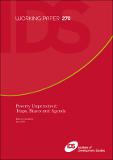Poverty unperceived : traps, biases and agenda
Abstract
With the priority of poverty reduction and with accelerating change in many
dimensions, up-to-date and realistically informed perceptions of the lives and
conditions of people living in poverty have come to matter more than ever. At
the same time, new pressures and incentives increasingly trap decision-makers
in headquarters and capital cities, reinforcing earlier (1983) analysis of the
attraction of urban ‘cores’ and the neglect of rural ‘peripheries’. These trends
make decision-makers’ learning about poverty and from people living in poverty
rarer and ever more important. One common means has been rural
development tourism, the phenomenon of the brief rural visit from an urban
centre. In 1983, six biases of such visits – spatial, project, person, seasonal,
diplomatic and professional - against seeing, meeting and learning from the
poorer people, were identified and described. Security can now be added as a
seventh.
Much can be done to offset the biases. The solution is to make more visits, not
fewer, and to enjoy doing them better. In addition, new and promising
approaches have been pioneered for experiential, direct learning, face-to-face
with poor and marginalised people. Examples are: UNHCR’s annual
participatory assessments by staff; SDC’s ‘views of the poor’ participatory
research in Tanzania; and various forms of immersion, most recently those being
convened and organised by ActionAid International. In many immersions,
outsiders become guests for a few days and nights, and live, experience and
learn in a community. The question now is not how an organisation can afford
the time and other resources for immersions for its staff. It is how, if it is
seriously pro-poor, it can possibly not do so.
This paper is a challenge to development actors to practice a responsible
pro-poor professionalism; to be pioneers and champions, seizing and making
space for themselves and others to offset the biases and traps of headquarters
and capital cities; and to have the vision and guts to seek out direct experiential
learning and so to be in touch and up-to-date with the realities of the people
living in poverty whom they seek to serve.
Keywords: poverty, perception, aid, personal learning, biases, realism,
immersions
Citation
Chambers, R. (2006) Poverty unperceived : traps, biases and agenda. Working paper series, 270. Brighton: IDS.Is part of series
IDS working papers;270Library catalogue entry
http://bldscat.ids.ac.uk/cgi-bin/koha/opac-detail.pl?biblionumber=163801Rights holder
Institute of Development StudiesCollections
- IDS Research [1671]

